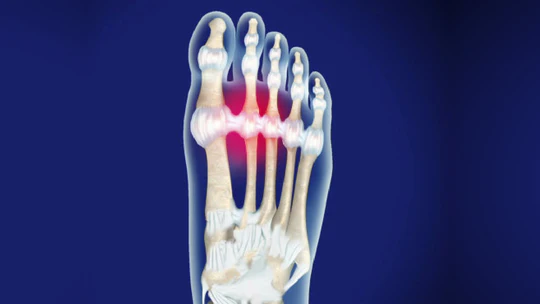MTP Synovitis
MTP Synovitis is a sharp or aching pain in the ball of the foot almost always centered from the base of the second toe. It is an indicator of the smaller bone in the toe separating from the larger metatarsal bone in the foot due to increased stress on the joint of the toe.
WHAT CAUSES MTP SYNOVITIS?
MTP Synovitis can be caused by increased stress on the joint of the base of the big toe. This stress can cause inflammation and degeneration of the ligaments and surrounding tissues. Activities that put an excessive amount of stress on the ball of the foot such as: climbing, ladders, squatting, stair climbling, or wearing high heels can lead to MTP Synovitis.
HOW DO I KNOW IF I HAVE MTP SYNOVITIS?
WHAT ARE THE SYMPTOMS OF MTP SYNOVITIS?
- Sharp aching pain in the ball of the foot
- Joint pain and instability
- Swelling of the joint as well as warmth and tenderness
- Toe is thickened, curled, or displays hammer toe likeness
- Pain increases when standing, barefoot, or walking on hard surfaces
- Deformity of the toe (the toe may start to dislocate and start to deviate in or outward)
HOW IS MTP SYNOVITIS DIAGNOSED?
MTP Synovitis is diagnosed through a physical examination and X-Ray, MRI or Ultrasound.
WHAT CAN I DO FROM HOME FOR MTP SYNOVITIS?
WHAT CAN I DO TO PREVENT MTP SYNOVITIS?
Avoid activities that will place too much stress on the ball of the foot.
WHAT TREATMENTS CAN I DO FROM HOME FOR MTP SYNOVITIS?
Wear proper orthotics or shoes that support and pad the ball of the foot. Wrap the foot in a bandage and tape the toes straight and toegether.
WHEN SHOULD I SEE A DOCTOR FOR MTP SYNOVITIS?
If you are unable to treat the pain from home with anti-inflammatory medication and other at home treatments you will need to schedule an appointment with a foot specialist.
WHAT TREATMENTS ARE AVAILABLE FOR MTP SYNOVITIS?
Non-Surgical:
Anti-inflammatory medications, cortisone injections, adapting shoe wear, and taping the toe. Approximately 70% of all MTP Synovitis cases are able to be resolved without surgery.
Surgical:
If you have a severe case of MTP Synovitis a foot specialist may reccomend surgery. Surgery consists of shortening osteotomies (shortening or changing the position of the bone) or a tendon transfer. Surgical procedures have a very high (80% – 90%) success rate.

